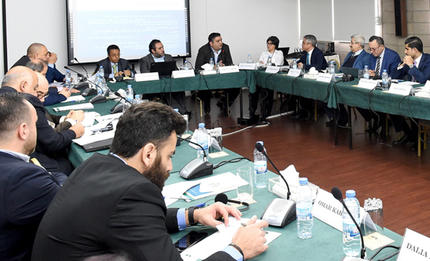Preparing for the Parliamentary Elections
LAU hosts election experts to underline the importance of the upcoming parliamentary elections.

The conference brought together Lebanese, Arab and European diplomats in addition to experts and academics from the MENA region.
As Lebanon gears up for its first parliamentary elections since 2009, the Department of Social Sciences at the Lebanese American University organized a conference on the “Effectiveness of Electoral Laws in Securing Fair Representation; Countries in Transition,” in collaboration with the Arab Network for Democratic Elections (ANDE).
The conference, which took place December 7 and 8 on LAU’s Byblos campus, brought together Lebanese, Arab and European diplomats in addition to experts and academics from Jordan, Palestine, Kuwait, Yemen, Sudan, Algeria, Iraq, Egypt, Tunisia and Morocco.
The event covered a number of topics, including an overview of ballot systems in Arab countries, the possibility of moving from a majority-vote to a proportional method in Lebanon, and ways to enhance participation in the elections.
Chair of the Department of Social Sciences and Associate Professor Marwan Rowayheb introduced ANDE Co-Founder Ziad Abdel Samad and keynote speaker MP Ghassan Moukheiber.
Moukheiber described the coming elections, which are slated to take place in spring 2018, as a “major challenge that will enable Lebanon to attain a democracy based on the sovereignty of the people and their right to choose.”
He called for a more inclusive electoral system that ensures representation of minority groups, and criticized Lebanon’s historical exclusion of military personnel and voters under 21, in addition to the absence of a female quota.
Rowayheb noted that the timing of the conference was important because Lebanon is still in “the process of drafting and implementing the electoral law.” At the same time, the Arab world is “going through a transition, and one of the basic cornerstones for democratization is to draft an electoral law that provides fair and free elections,” he added.
For most LAU students, the upcoming elections will be their first time voting.
Maria Tannous, a master’s student in International Affairs, said she was interested to see what the debate on the electoral law yields: a proportional or majority-vote system.
However, Tannous, who said she would vote for new and independent candidates, added that whichever model is chosen is not important as long “sectarianism is drafting every system, which means that we are ending up with the same problem.”
Political Science and International Affairs major Christa Maria El Hoayek said the conference helped her understand technical details of elections, such as the division of districts, the potential use of pre-printed ballots and the question of a women’s quota.
The conference was also a way for non-Lebanese students to learn about the potential for change in the electoral systems of their own countries.
For Political Science and International Affairs senior Sofiane Timtaoucine, who comes from Algeria, the hope is for “a more democratic parliament, more representative of the people,” in his homeland. “We need people who have a vision for the country.”
More
Latest Stories
- LAU Athletes Bring Home Trophies from Athens and Belgrade
- From Ruins to Resources: Reimagining Lebanon’s Post-Destruction Urban Spaces
- Medical Graduates Showcase their Research Leadership
- To Dance Toward Tomorrow
- Six LAU Faculty Listed Among the World’s Top 0.05 Percent by ScholarGPS
- Lebanon’s Brightest Compete for LAU Engineering Scholarships
- This Summer: Robotics and Artificial Intelligence Summer School for Middle Schoolers
- Into the Psychology of Justice

